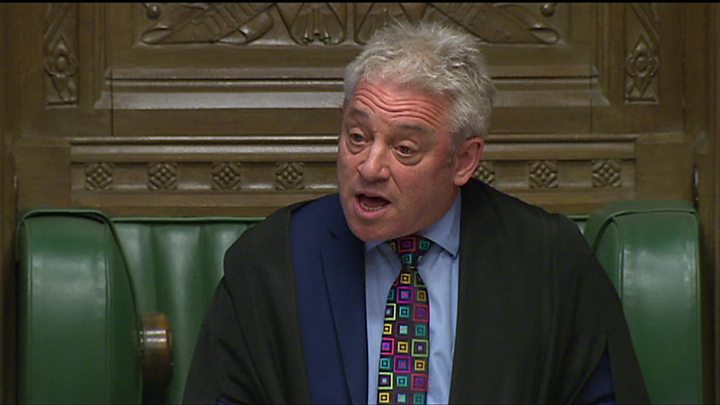VIDEO - Third Brexit vote must be different - Speaker - BBC News

Media playback is unsupported on your device
Media caption Speaker John Bercow rejects further Brexit votes without changes to motionJohn Bercow has ruled out another vote on the government's previously rejected Brexit agreement if the motion remains "substantially the same".
He told MPs parliamentary conventions dating back to 1604 meant they could not be asked to vote on precisely the same subject twice in the same session.
MPs rejected Theresa May's Brexit deal with the EU by 149 votes last week.
Mr Bercow's ruling came as the government considers a third attempt to get the deal through Parliament.
He said the second vote on the prime minister's deal last week was "in order" but any further votes must pass the "test" he had set out in order to be allowed.
The BBC's Laura Kuenssberg said the Speaker's intervention could have a "massive" impact on the Brexit process - with 11 days to go before the UK is scheduled to leave the EU on 29 March.
Mrs May had previously committed to holding a new vote on her withdrawal agreement in the coming days, but ministers have said this will not happen unless they are "confident" of victory.
The prime minister's official spokesman said Mr Bercow "did not warn us of the contents of the statement or indeed the fact that he was making one".
What has the Speaker ruled?
Mr Bercow made his ruling in response to what he said were concerns from MPs across Parliament that the government intended to "bring the same deal back to the House ad infinitum" and ask them to "repeatedly pronounce on fundamentally the same proposition".
Last week's second vote on the deal had not fallen foul of parliamentary conventions, he made clear.
This was because the government had secured "legal changes" to its existing agreement with the EU, set out in three new documents, and therefore what MPs had been asked to consider was different from the agreement rejected by 230 votes in January.
But quoting Erskine May, the parliamentary rulebook, he said "what the government cannot legitimately do is resubmit to the House the same proposition - or substantially the same proposition - as that of last week, which was rejected by 149 votes".
This convention, he added, was "necessary to ensure the sensible use of the House's time and the proper respect for the decisions it takes".
Pressed on what future votes would be allowed, Mr Bercow said would make an "honest assessment" when the time came and the ruling should be not be regarded as final.
But he suggested there would have to be a "demonstrable" change in what MPs were being asked to vote on - "not different in terms of wording but different in terms of substance".
What's been the reaction?
Ministers and MPs supportive of Mrs May's deal expressed anger at the timing of Mr Bercow's intervention.
Conservative MP James Gray, who plans to vote for the deal after rejecting it twice, said he was "absolutely furious"; while fellow Tory Greg Hands suggested Mr Bercow was the only person in the country who was "accountable to nobody".
Solicitor General Robert Buckland warned there was now a "constitutional crisis" and suggested the onus was on the EU to come up with "new solutions" to enable MPs to vote on the deal again.
"The Speaker has made his name by being interventionist," he said.
"Frankly we could have done without this but it is something we are going to have to deal with."
He suggested "there were ways around this" - including potentially cutting short the current session of Parliament to an end, a move which would lead to calls for a general election.
Brexit: what do we know?
- As the law stands, the UK will leave the EU on 29 March - with or without a deal
- For this date to change, the EU would have to agree to an extension to Article 50 - the legal mechanism that sees the UK leaving on 29 March - or the UK government would have to revoke it, stopping the Brexit process
- Last week, MPs voted in favour of an extension - either for up to three months to pass legislation if the PM's deal got approval from the House or for longer if her deal was rejected - but it was not legally binding
- Theresa May was expected to bring her deal back to the Commons for a third time in the coming days
- Now, Speaker John Bercow has said the deal cannot be brought back for another vote if it remained "substantially the same"
- There's an EU leaders summit on Thursday and Friday this week
Opponents of the PM's Brexit deal welcomed the Speaker's ruling.
Conservative former cabinet minister Owen Paterson said it was a "game-changer" and would "concentrate minds" ahead of a EU summit on Thursday - at which EU leaders will consider whether to grant the UK an extension to the Brexit process.
He said the prime minister should make it very clear to her European counterparts that the "law of the land" stated the UK would leave, with or without a deal, on 29 March.
Sir Bill Cash, chairman of the European Scrutiny Committee, said it seemed to make an "enormous amount of sense" given that the Brexit deal has been defeated twice and there would need to be a "substantial difference" to allow a third vote.
But the SNP's Westminster leader Ian Blackford suggested there was now a "constitutional crisis" and he suggested the prime minister should "immediately" call a meeting of opposition leaders.